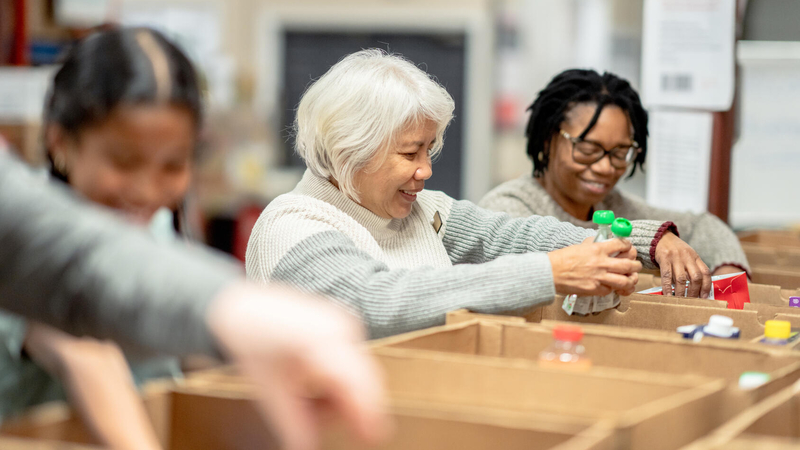-
Health & Wellness
Mayo Clinic Q and A: Health benefits of volunteering

DEAR MAYO CLINIC: My neighbor recently retired, and I've been trying to convince her to volunteer at the library with me. She's not swayed by my stories of feeling good from helping others. Can you share some other benefits of dedicating her time and energy to a cause?
ANSWER: Thank you for volunteering in your community and for trying to persuade your neighbor to join you. Volunteers make an immeasurable difference in people's lives.
The act of volunteering also benefits a person's health as well. Research has shown that volunteering offers significant health benefits, especially for older adults. Here are the top three you can share with your neighbor:
1. Improves physical and mental health.
Volunteer activities keep people moving and thinking at the same time. Research has found that volunteering among adults who are 60 and older provided benefits to physical and mental health. Volunteers report better physical health than nonvolunteers. Volunteering leads to lower rates of depression and anxiety, especially for people 65 and older.
It reduces stress and increases positive, relaxed feelings by releasing dopamine in the brain. By spending time in service to others, volunteers report feeling a sense of meaning and appreciation, both given and received, which can have a stress-reducing effect.
Reduced stress further decreases the risk of some physical and mental health problems, including heart disease, stroke, depression, anxiety and general illness. In addition, people who volunteer have lower mortality rates than those who do not, even when controlling for age, sex and physical health.
2. Provides a sense of purpose and teaches valuable skills.
The work that volunteers provide is essential to everyday activities, giving volunteers a sense of purpose, especially when giving their time and talents in the areas they find meaningful. Older volunteers experience greater increases in life satisfaction and self-esteem.
In addition to volunteering at libraries, schools and food pantries, many people volunteer at local hospitals. They serve as greeters and waiting room attendants, provide patient room information and directions, and help transport patients and patient items.
Other volunteers use their craft skills to make prayer shawls, blankets, sweaters and hats that are typically given to newborn babies and patients with cancer. Other services volunteers provide include working in the hospital gift shop, performing clerical duties for staff or offering pet therapy to patients.
3. Nurture new and existing relationships.
Volunteering increases social interaction and helps build a support system based on common interests. One of the best ways to make new friends and strengthen existing relationships is to participate in a shared activity. Social circles can shrink in retirement so building or expanding networks can be especially important during this phase of your neighbor's life.
In many cases, volunteers have diverse backgrounds, which helps expand their social network and allows them to practice social skills with others.
As you may have found from your own experience, people are motivated to volunteer for several reasons. They may be exploring careers, sharpening skills, meeting new people, serving their communities or staying active during retirement. Yet all volunteers share a common desire to improve the health and welfare of people in their communities.
The good news is that your neighbor doesn't need to be a philanthropist or senator to enhance or create change in the community. Offer other suggestions if she's not interested in volunteering at the library. Likely, there are a wide variety of volunteer opportunities in your community, whether she's interested in youth, environmental, health, religious or community causes. Encourage her to connect with local nonprofit and cultural organizations, schools, faith communities or hospitals for options.
As you have discovered, volunteering makes an immeasurable difference in people's lives. If your neighbor is open to it, her time and talents can help others and benefit her health at the same time. — Angela Thoreson, licensed independent clinical social worker, Psychiatry & Psychology, Mayo Clinic Health System, Austin, Minnesota
Related Articles







